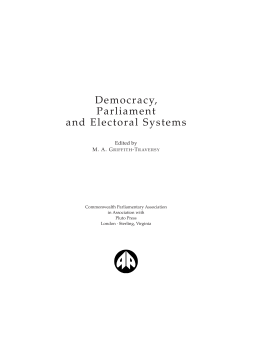
Additional Information
Book Details
Abstract
This book examines the importance of democracy as a system of government. Exploring various forms of democratic government throughout the world, the essays assess how democracy works in theory and in practice.
Chapters cover how to improve democracy using case studies from the Caribbean and Spain, how to make parliaments more effective through technology and the structure of parliamentary bodies. the comparative benefits of different electoral systems.
The contributors also examine problems thrown up by various recent elections including the American election in 2000, Sri Lanka, Poland and various African experiences.
Table of Contents
| Section Title | Page | Action | Price |
|---|---|---|---|
| Contents | v | ||
| l Introduction: democracy, parliaments and electoral systems | 1 | ||
| 2 Enhancing democracy: a Caribbean perspective | 7 | ||
| 3 Transparency, integrity and funding of the political process | 19 | ||
| 4 The Spanish transition: dictatorship to democracy | 25 | ||
| 5 Strengthening parliament's role | 31 | ||
| 6 Do unicameral or bicameral parliaments function more effectively? | 47 | ||
| 7 Information technology and parliamentary effectiveness | 59 | ||
| 8 Alternative electoral systems | 73 | ||
| 9 Mandatory voting: the pros and cons | 83 | ||
| 10 Gender equality and electoral systems | 89 | ||
| 11 Holding elections: the mechanics | 99 | ||
| 12 External influences on electoral processes | 107 | ||
| i) Exit polls, time zones and length of elections | 107 | ||
| ii) Opinion polling and the media | 114 | ||
| 13 Ethnically divided polities: the case of Sri Lanka | 123 | ||
| 14 The United States Presidential election: year 2000 | 127 | ||
| 15 Disputed election results: various African experiences | 131 | ||
| 16 Evolving electoral systems: the experience of Poland | 135 | ||
| 17 The New Zealand experience of changing electoral systems | 141 | ||
| Afterword | 147 | ||
| Appendices: A List of participants at the CPA/ Wilton Park conference | 151 | ||
| B Reference material | 159 |
